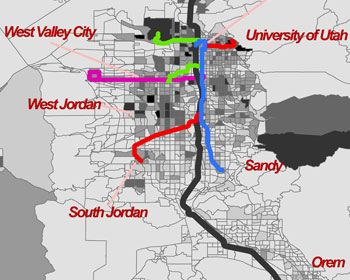

Research Reports |
| Title: | First and Last Mile Assessment for Transit Systems |
| Authors: | Xiaoyue Cathy Liu, Richard J. Porter, Milan Zlatkovic, Kiavash Fayyaz, and Jeffrey Taylor |
| Publication Date: | May 2018 |
| Report #: | MPC-18-347 |
| Project #: | MPC-466 |
| TRID #: | 01675111 |
| Keywords: | accessibility, automobile travel, environmental impacts, evaluation and assessment, health, modal shift, public transit, savings |
| Type: | Research Report – MPC Publications |
 The First Mile Last Mile (FMLM) challenge garners significant attention as a means to assess the accessibility of the first leg to transit and the last leg from public transit. As a critical barrier to public transit accessibility, the challenge provides many opportunities to closely analyze conditions from the level of the transit station upwards to the level of the system-wide network. Its usefulness in contributing to the body of knowledge on barriers to transit access provides planners and researchers important information with implications in increasing ridership, transit efficiency, multimodal travel options, and accessible mobility. In this project, we propose a methodological framework for analyzing the FMLM problems by determining varying causes of poor public transit accessibility and identifying areas with immediate needs for improvements. We showcase the analytical framework using a transit network in the state of Utah operated by the Utah Transit Authority. We also conducted analysis on the impacts of reduced automobile use on personal and environmental health. As a companion product, a spreadsheet-based sketch planning tool is developed to estimate health cost savings as a result of mode shifts from private automobiles to active transportation options.
The First Mile Last Mile (FMLM) challenge garners significant attention as a means to assess the accessibility of the first leg to transit and the last leg from public transit. As a critical barrier to public transit accessibility, the challenge provides many opportunities to closely analyze conditions from the level of the transit station upwards to the level of the system-wide network. Its usefulness in contributing to the body of knowledge on barriers to transit access provides planners and researchers important information with implications in increasing ridership, transit efficiency, multimodal travel options, and accessible mobility. In this project, we propose a methodological framework for analyzing the FMLM problems by determining varying causes of poor public transit accessibility and identifying areas with immediate needs for improvements. We showcase the analytical framework using a transit network in the state of Utah operated by the Utah Transit Authority. We also conducted analysis on the impacts of reduced automobile use on personal and environmental health. As a companion product, a spreadsheet-based sketch planning tool is developed to estimate health cost savings as a result of mode shifts from private automobiles to active transportation options.
Liu, Xiaoyue Cathy, Richard J. Porter, Milan Zlatkovic, Kiavash Fayyaz, and Jeffrey Taylor. First and Last Mile Assessment for Transit Systems, MPC-18-347. North Dakota State University - Upper Great Plains Transportation Institute, Fargo: Mountain-Plains Consortium, 2018.